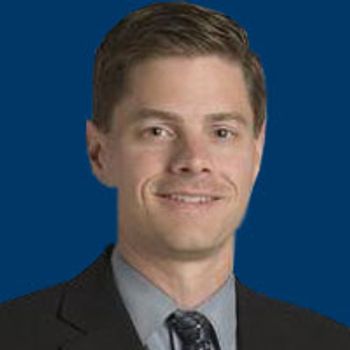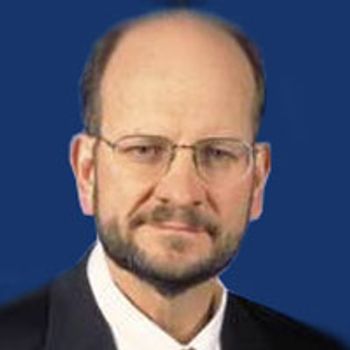
John A. Glaspy, MD, discusses challenges and progress with immunotherapy in gynecologic cancers.

Your AI-Trained Oncology Knowledge Connection!


John A. Glaspy, MD, discusses challenges and progress with immunotherapy in gynecologic cancers.

Maryann J. Kwa, MD, discusses the optimal duration of endocrine therapy in the treatment of patients with early-stage ER-positive breast cancer.

Joshua Bauml, MD, discusses the limitations of PD-L1 and tumor mutational burden as immunotherapy biomarkers in non–small cell lung cancer and emerging biomarkers showing promise in the field.

Evan Ya-Wen Yu, MD, discusses the evolution of treatment for patients with castration-sensitive prostate cancer and how he decides between treatment with abiraterone and docetaxel for this population.

The combination of the CDK4/6 inhibitor palbociclib and cetuximab induced an overall response rate of 39% in patients with platinum-resistant, HPV-unrelated recurrent/metastatic head and neck squamous cell carcinoma.

Brock O’Neil, MD, discusses the struggles with treating localized bladder cancer in both the neoadjuvant and adjuvant settings, as well as the advancements with robotic cystectomy.

Michael A. Savin, MD, shares his insight on adjuvant endocrine therapy for premenopausal women with hormone receptor-positive breast cancer.

Alex E. Denes, MD, discusses the mixed results looking at the optimal duration of adjuvant endocrine therapy in postmenopausal women with breast cancer.

Combining pixantrone (Pixuvri) with rituximab (Rituxan) failed to improve progression-free survival compared with gemcitabine plus rituximab in patients with aggressive B-cell non-Hodgkin lymphoma.

Jacqueline Vuky, MD, discusses the management of metastatic disease and CDK4/6 inhibitors in breast cancer.

Stephen Liu, MD, addresses the use of available therapies and the methods of overcoming acquired resistance in patients with ALK-positive non–small cell lung cancer.

Petros Grivas, MD, PhD, discusses ongoing clinical trials exploring novel approaches with the potential to change practice in advanced bladder cancer.

David B. Page, MD, discusses emerging treatment approaches for patients with triple-negative breast cancer.

Vicky Makker, MD, discusses the updated phase Ib/II results of the combination of pembrolizumab and lenvatinib and the future of endometrial cancer treatment.

Brian I. Rini, MD, discusses atezolizumab plus bevacizumab as an effective frontline combination in renal cell carcinoma, as well as patient reported outcomes with the regimen.

Francisco J. Esteva, MD, PhD, discusses recent advances and clinical findings with HER2-targeted therapies across the neoadjuvant, adjuvant, and metastatic settings.

Ajai Chari, MD, discusses the addition of daratumumab to carfilzomib and dexamethasone, as well as the potential impact of subcutaneous daratumumab in the treatment of patients with myeloma.

Sumanta Kumar Pal, MD, sheds light on the latest frontline therapeutic options for patients with mRCC and other advancements on the horizon.

Maura Dickler, MD, expands on the findings with abemaciclib presented at the 2018 ASCO Annual Meeting and what some of the next steps are for the CDK4/6 inhibitor.

The European Commission has approved dasatinib for the treatment of children and adolescent patients aged 1 to 18 years with Philadelphia chromosome–positive chronic myeloid leukemia in chronic phase.

Scott Samuelson, MD, discusses frontline treatment of patients with prostate cancer and subsequent sequencing.

Dennis J. Slamon, MD, PhD, discusses new opportunities for treatment advances in ovarian cancer.

Marina Chiara Garassino, MD, reflects on the first-line approval of osimertinib, recent data with durvalumab, and the promise for combination chemoimmunotherapy in patients with non–small cell lung cancer.

A de-escalated, chemotherapy-free neoadjuvant regimen of letrozole plus dual HER2 blockade showed promise in patients with HER2+/HR+ breast cancer who first achieved a molecular response to 2 weeks of letrozole.

Kelly McCann, MD, PhD, discusses the process of DNA damage and repair, resistance to PARP inhibitors, and rational combination strategies to overcome resistance.

Andy Hahn, MD, discusses the ongoing debate between abiraterone and docetaxel and the optimal patient selection for each agent in patients with metastatic hormone-sensitive prostate cancer.

Upfront treatment with atezolizumab plus nab-paclitaxel significantly reduced the risk of disease progression or death compared with nab-paclitaxel alone in patients with metastatic or unresectable locally advanced triple-negative breast cancer.

The FDA has granted a priority review designation to a supplemental biologics license application for first-line pembrolizumab for use in combination with carboplatin/paclitaxel or nab-paclitaxel for the treatment of patients with metastatic squamous non–small cell lung cancer, regardless of PD-L1 expression.

The European Medicines Agency’s CHMP has recommended approval of axicabtagene ciloleucel (axi-cel; Yescarta) as a treatment for adult patients with relapsed/refractory diffuse large B-cell lymphoma or primary mediastinal large B-cell lymphoma.

Michael Savin, MD, discusses the emergence of biosimilars in oncology, and why there are still obstacles with incorporating them into clinical practice.